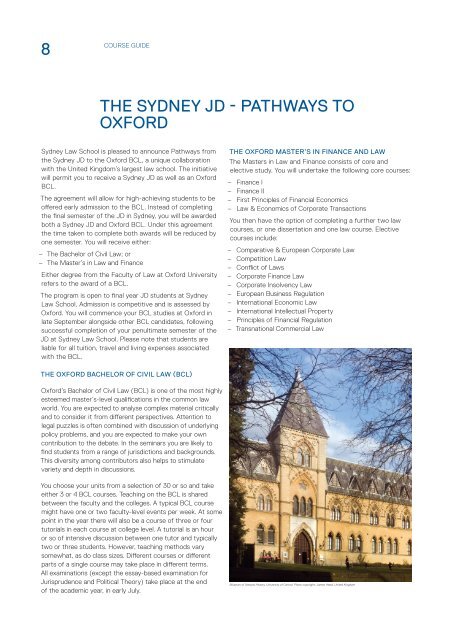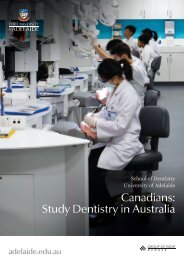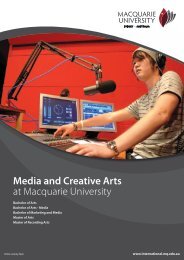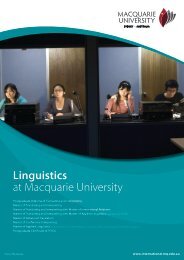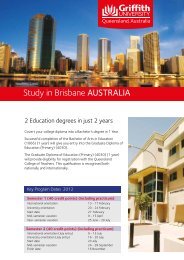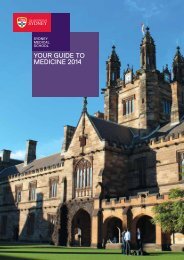(JD) Guide - The University of Sydney
(JD) Guide - The University of Sydney
(JD) Guide - The University of Sydney
- No tags were found...
You also want an ePaper? Increase the reach of your titles
YUMPU automatically turns print PDFs into web optimized ePapers that Google loves.
8COURSE GUIDETHE SYDNEY <strong>JD</strong> - PATHWAYS TOOXFORD<strong>Sydney</strong> Law School is pleased to announce Pathways fromthe <strong>Sydney</strong> <strong>JD</strong> to the Oxford BCL, a unique collaborationwith the United Kingdom’s largest law school. <strong>The</strong> initiativewill permit you to receive a <strong>Sydney</strong> <strong>JD</strong> as well as an OxfordBCL.<strong>The</strong> agreement will allow for high-achieving students to be<strong>of</strong>fered early admission to the BCL. Instead <strong>of</strong> completingthe final semester <strong>of</strong> the <strong>JD</strong> in <strong>Sydney</strong>, you will be awardedboth a <strong>Sydney</strong> <strong>JD</strong> and Oxford BCL. Under this agreementthe time taken to complete both awards will be reduced byone semester. You will receive either:––<strong>The</strong> Bachelor <strong>of</strong> Civil Law; or––<strong>The</strong> Master’s in Law and FinanceEither degree from the Faculty <strong>of</strong> Law at Oxford <strong>University</strong>refers to the award <strong>of</strong> a BCL.<strong>The</strong> program is open to final year <strong>JD</strong> students at <strong>Sydney</strong>Law School. Admission is competitive and is assessed byOxford. You will commence your BCL studies at Oxford inlate September alongside other BCL candidates, followingsuccessful completion <strong>of</strong> your penultimate semester <strong>of</strong> the<strong>JD</strong> at <strong>Sydney</strong> Law School. Please note that students areliable for all tuition, travel and living expenses associatedwith the BCL.THE OXFORD MASTER’S IN FINANCE AND LAW<strong>The</strong> Masters in Law and Finance consists <strong>of</strong> core andelective study. You will undertake the following core courses:––Finance I––Finance II––First Principles <strong>of</strong> Financial Economics––Law & Economics <strong>of</strong> Corporate TransactionsYou then have the option <strong>of</strong> completing a further two lawcourses, or one dissertation and one law course. Electivecourses include:––Comparative & European Corporate Law––Competition Law––Conflict <strong>of</strong> Laws––Corporate Finance Law––Corporate Insolvency Law––European Business Regulation––International Economic Law––International Intellectual Property––Principles <strong>of</strong> Financial Regulation––Transnational Commercial LawTHE OXFORD BACHELOR OF CIVIL LAW (BCL)Oxford’s Bachelor <strong>of</strong> Civil Law (BCL) is one <strong>of</strong> the most highlyesteemed master’s-level qualifications in the common lawworld. You are expected to analyse complex material criticallyand to consider it from different perspectives. Attention tolegal puzzles is <strong>of</strong>ten combined with discussion <strong>of</strong> underlyingpolicy problems, and you are expected to make your owncontribution to the debate. In the seminars you are likely t<strong>of</strong>ind students from a range <strong>of</strong> jurisdictions and backgrounds.This diversity among contributors also helps to stimulatevariety and depth in discussions.You choose your units from a selection <strong>of</strong> 30 or so and takeeither 3 or 4 BCL courses. Teaching on the BCL is sharedbetween the faculty and the colleges. A typical BCL coursemight have one or two faculty-level events per week. At somepoint in the year there will also be a course <strong>of</strong> three or fourtutorials in each course at college level. A tutorial is an houror so <strong>of</strong> intensive discussion between one tutor and typicallytwo or three students. However, teaching methods varysomewhat, as do class sizes. Different courses or differentparts <strong>of</strong> a single course may take place in different terms.All examinations (except the essay-based examination forJurisprudence and Political <strong>The</strong>ory) take place at the end<strong>of</strong> the academic year, in early July.Museum <strong>of</strong> Natural History, <strong>University</strong> <strong>of</strong> Oxford. Photo copyright: James Head, United Kingdom


